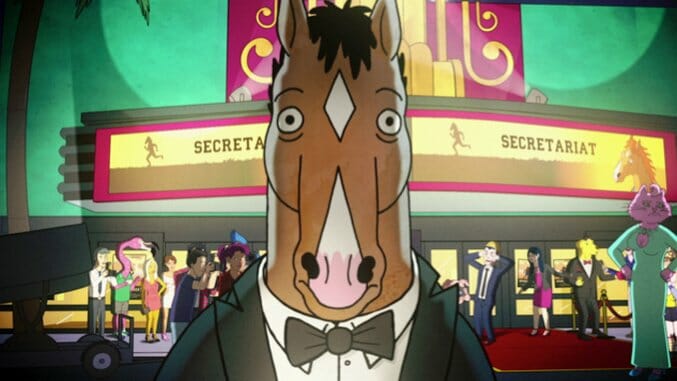Five Reasons to Watch the New Season of Netflix’s BoJack Horseman
Images via Netflix
Netflix’s key art for BoJack Horseman season three likens him to some of TV’s most legendary antiheroes, and rightfully so. BoJack can dole out damage, emotional or otherwise, with the worst of them—he’s been his own most ruthless saboteur since this brilliant tragicomedy’s beginning. In the series’ junior season, somehow, the washed-up Horsin’ Around star finds himself resurgent, with his starring role in Secretariat delivering his dreams on a silver platter. But the brilliance of BoJack, as ever, is its insistence on a particularly harsh reality that flies in the face of traditional narrative: people don’t change. Even when BoJack has everything he ever wanted, none of it satisfies. “Dream come true,” he shrugs.
These new episodes find BoJack picking up the pieces after his brush with rock bottom in last season’s devastating “Escape from L.A.,” a prominent reminder of which graces his front lawn in the form of his yacht that bears that same name. BoJack’s shame followed him home, and it poisons what little joy he might otherwise have been able to wring out of all the Oscar buzz that’s also following him around after Secretariat. As if B.J.’s heart-rending struggles to live with himself weren’t compelling enough, season three is as packed to the gills—animal jokes come with the territory here—with rapid-fire banter and animalian sight gags as ever. BoJack remains the most pause-worthy show on TV—fortunately for us all, it’s on Netflix.
Here are five reasons BoJack Horseman’s superb third season is worth savoring.
1. The voice talent is all kinds of excellent.
Star power has never been a problem for BoJack and its deceptively stacked voice cast. Will Arnett was born to voice this character, and his Emmy-level performance is shockingly easy to overlook in light of all that is working so well on this show. But Arnett is the foremost member of a bench that has gotten Marianas Trench-deep here in season three. Though old hands Aaron Paul, Alison Brie, Amy Sedaris and Paul F. Tompkins are all doing expectedly stellar work, a cavalcade of new voice actors brings a whole new level of excitement and variety to the show, including everyone from Angela Bassett and Abbi Jacobson to Dave Franco and Lorraine Bracco (voicing a therapist, no less).
Jacobson is a particularly welcome addition as Emily, an old friend of Todd’s, whose warmth and endearing affection finally give Paul’s tenuous character some solid ground to stand on. Veep’s Diedrich Bader is a delight as Prince Carolyn’s robotic bearded assistant, Judah, while Jeffrey Wright is terrific as Cuddly Whiskers, a self-important rodent screenwriter who unwittingly enables BoJack to torpedo his post-Horsin’ Around career. But it’s Bassett who shines the brightest as B.J.’s (figurative) bulldog of a publicist, Ana Spanakopita, as silky smooth as she is fierce. All told, BoJack Horseman has never sounded so good.
2. Sight gags for days—nay, weeks.
-

-

-

-

-

-

-

-

-

-

-

-

-

-

-

-

-

-

-

-

-

-

-

-

-

-

-

-

-

-

-

-

-

-

-

-

-

-

-

-








































